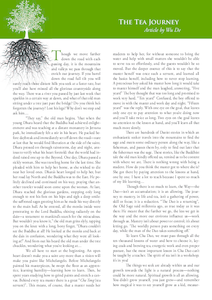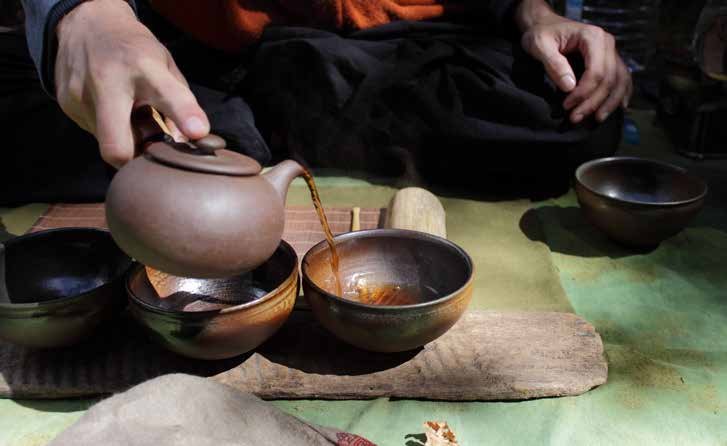
 |
|
Though we move further down the road with each passing day, it is the mountains and valleys we pass through that enrich our journey. If you barrel down the road full tilt you will surely reach those distant hills you seek at a faster rate, but you'll also have missed all the glorious countryside along the way. There was a river you passed by just last week that sparkles in a certain way at dawn, and what of that old man sitting under a tree just past the bridge? Do you think he's forgotten the journey? Lost his legs? Why don't we stop and ask him...
"They say," the old man begins, "that when the young Dhara heard that the Buddha had achieved enlightenment and was teaching at a distant monastery in Jetvana park, he immediately felt a stir in his heart. He packed before daybreak and immediately set off down the road - sure at last that he would find liberation at the side of the saint. Dhara pressed on through rainstorms, day and night, anxious to verify what his heart foretold: that the world had indeed raised one up to the Beyond. One day, Dhara passed a sickly woman. She was traveling home for the last time. She pleaded with him to help her home, as she wished to die near her loved ones. Dhara's heart longed to help her, but her road lay North and the Buddha was to the East. He politely declined and continued on his way, praying that another traveler would soon come upon the woman. At last, Dhara reached the glorious gardens, stopping only long enough to rest his fists on his hips and sigh a deep smile: the saffroned sages greeting him as he made his way directly to the main hall. As he entered, all the monks inside were prostrating to the Lord Buddha, shining radiantly on the dais - a testament to mankind's search for the miraculous. But wouldn't you know it," the old man grins slyly, tapping you on the knee with a long, bony finger, "Dhara couldn't see the Buddha at all! He looked at the monks and back at the dais in confusion, wondering what they were all looking at!" And from out his beard the old man under the tree chuckles, wondering what you're looking at...

We all have to start at the beginning. An open heart doesn't make you a saint any more than a vision will make you paint like Michelangelo. Before Michelangelo painted his masterpieces, he swept the floor as an apprentice, learning humility - learning how to learn. Then, he spent years studying how to grind paints and stretch a canvas. Behind every tea master there is a great "Cha Tong (tea servant)". This means, of course, that a master needs her students to help her, for without someone to bring the water and help with small matters she wouldn't be able to serve tea so effortlessly, and the guests wouldn't be so moved. But the deeper essence of this is to say that the master herself was once such a servant, and learned all the basics herself, including how to never stop learning. A precocious boy asked his master how long it would take to master himself and the man laughed, answering, "Five years!" The boy thought that was too long and promised to work very hard. "Ten years!" Confused, the boy offered to move in with the master and work day and night. "Fifteen years!" was the reply. With one eye on the goal, that leaves only one eye to pay attention to what you're doing now and you'll take twice as long. Two eyes on the goal leaves no attention to the lesson at hand, and you'll learn all that much more slowly.
There are hundreds of Daoist stories in which an enthusiastic seeker travels into the mountains to find the sage and meets some ordinary person along the way, like a fisherman, and passes them by, only to find out later that the fisherman was the sage. These stories, like the Buddhist tale the old man kindly offered us, remind us to be content with where we are. There is nothing wrong with being a student. How do you think the master got to where she is? She got there by paying attention to the lessons at hand, one by one. I have a lot to teach because I spent so much of my life learning...
Though there is so much to learn, the Way - the Dao - isn't an accumulation; it is an allowing. The journey to mastery, in life and tea, isn't a gathering of power, skill or focus; it is a reduction. "The Dao is a returning", the Old Sage said millennia ago, as true today as it was then: He meant that the further we go, the less we get in the way and the more our environs influence us - work through us. Mastery isn't about power or control; it's about letting go. 'The worldly person puts something on every day, while the man of the Dao takes something off.'
To learn Cha Dao, we must pass through all the ten thousand lessons of water and how to choose it, laying coals and brewing tea, energetic work and even proper posture, but the most important lesson in Cha Dao can't be taught by a teacher. The spirit of tea isn't in a workshop; it's in you!
The things we seek are already within us and our growth towards the light is a natural process - nothing could be more natural. Spiritual growth is all an allowing. You didn't grow yourself, you just grew - and remember how magical it was to see yourself grow as a kid, measuring and remeasuring yourself against the lines on the lintel. You can aid in the growth, just as you can hinder it, but it isn't your doing. Teachers and traditions can help point the way, and sometimes provide the nutrients we need for growth, but the process is ours and ours alone. And so tea isn't something you learn in a class, from a book or an internet article - tea is your heart when it is open, connected to the Dao and channeling its Divinity. When you are living from the space in you that is connected to spirit and oneness, rather than the disconnected small self - when you are resting in your higher self, present and alive - you have found the goal of all Cha Dao, and the place out of which all great tea flows. Tea prepared form the still center of our hearts stirs others towards that place where we are all one, and leaves them forever transformed and healed. That is medicine. That is Cha Dao.
There are plenty of people at tea shops all over Asia that have great skill in making delicious tea, know all about tea processing, history and lore and can handle many kinds of pots well, but even twenty years later they haven't learned much about their inner nature or how to share that space with others in a meaningful way. This isn't to put down what they are doing or how they're doing it, rather to show that all the training in the world can't open a closed heart. Tea can be so much more than a delicious beverage or a hobby; it can be the plant medicine we need to harmonize this world. It isn't wrong to ignore tea's ability to connect us to Great Nature, to ourselves and to each other, but it is unfortunate if you do. What a world of difference such tea people could make if they awoke to the vitality and spiritual harmony in the Leaf, and instead of utilizing their amazing skills towards greater sensual satisfaction, focused more on healing the hearts of all the disconnected people around them!
It is when the great skills of a master meet the open heart of a beginner that the true magic happens. Though the greatest lesson in Cha Dao is the Dao, and not the Cha, this doesn't mean we should be lazy and not hone our ability to serve the medicine to others. If the tea is prepared well, its alchemy will flow much more smoothly. In the meantime, as we learn, enjoy the beginner's mind and be okay with being a student, with learning. If we stay centered in the most important lesson, that tea is in our hearts and we don't even need the plant to be with tea, then all the skills will harmonize with us and find their way into our hands in due course. There are a thousand not-so-perfect cups to be enjoyed along the way, each one a blessing and a gift!
